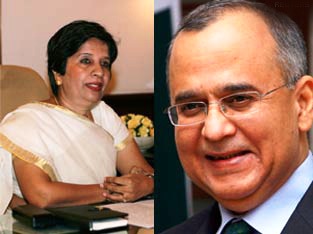India, Pakistan take 'first step' to rebuild broken trust
NEW DELHI: India said Thursday its first official talks with Pakistan in 14 months had been a "first step" towards putting their volatile relationship back on track after the devastating 2008 Mumbai attacks.
Indian Foreign Secretary Nirupama Rao and her Pakistani counterpart Salman Bashir met for three hours in New Delhi in peace talks seen as vital for regional stability and a key part of US war strategy in Afghanistan.
"We had set out to take a first step towards rebuilding trust and I believe my meeting with the Pakistan foreign secretary constituted that first step," Rao told reporters after the talks.
Arguments over the agenda and a brief exchange of fire between Indian and Pakistani border guards before the meeting had augured badly for major progress, and the statement from India was deliberately cautious.
New Delhi's offer earlier this month to resume official contacts with Pakistan had taken many by surprise and led to sharp criticism from the opposition, which saw it as a climbdown and a sign of weakness.
India froze all discussions with Pakistan after the Mumbai carnage 14 months ago in which 10 Islamist gunmen targeted multiple locations in the country's financial capital, killing 166 people.
India blamed the attack on Pakistan-based militants and said talks could only resume if Islamabad took concrete steps to bring those responsible to justice and cracked down on militant groups on its soil.
Rao stressed that India was still not prepared to resume a fully fledged peace process, called the Composite Dialogue, which began in 2004 and seeks to resolve all outstanding issues between the rivals.
"From our side, we certainly don't discount the achievements made by the Composite Dialogue... but the time is not right as yet to resume it because we have to create a climate of trust and confidence," she said.
"We have agreed to remain in touch," she added.
India's focus in the talks was tackling anti-India militancy across the border, which New Delhi believes Pakistan sponsors with its intelligence services.
"I spelt out forthrightly our concerns on terrorism emanating from Pakistan against India. I told my Pakistani counterpart that terrorism cannot advance any cause but the cause of senseless violence," she said.
During the talks, the Indian side handed the Pakistanis three dossiers on anti-India militants, including one that contained intelligence related to the Mumbai attacks.
Pakistan had balked at the Indian emphasis on terrorism and made it clear that all issues between the rivals should be up for discussion, including the seemingly intractable dispute over Muslim-majority Kashmir.
Rao said Pakistan had pushed for the Composite Dialogue to resume, which would include Kashmir.
The Himalayan region is held in part by Pakistan and India, but claimed in full by both. It has been the trigger for two out of the three wars the countries have fought since 1947.
Bashir met with senior Kashmiri separatist leaders on Wednesday, signalling Islamabad's intention of keeping Kashmir on the talks agenda.
Experts say Washington played a key role in nudging the two neighbours back to the table in an effort to keep a lid on South Asian tensions as it presses more troops into its fight against the Taliban in Afghanistan.
Top leaders from both countries have met several times since the Mumbai assault during regional conferences, but Thursday's meeting marked the first real move towards normalisation.
Writing in English-language Pakistani newspaper Dawn, guest columnist and retired Pakistani senior diplomat Tariq Fatemi said both sides needed to move beyond "talks about talks".
"It is now incumbent on both Delhi and Islamabad to recognise that the international community is simply tired of their constant bickering and frustrated with their inability to resolve their differences," he wrote.
The history of Indo-Pakistan dialogue is a long and patchy one, encompassing every form of contact from back-door diplomacy to prime-ministerial summits.
The only common factor has been the glacial pace of tangible progress in resolving the core disputes between two countries.






